Sacked: Brendan McCartney speaks in depth for the first time about his dramatic departure as Bulldogs coach
Brendan McCartney listened to a few minutes of the press conference announcing his sacking before turning it off. He didn’t like what he was hearing. How long did it take him to get over being moved on by the Dogs?
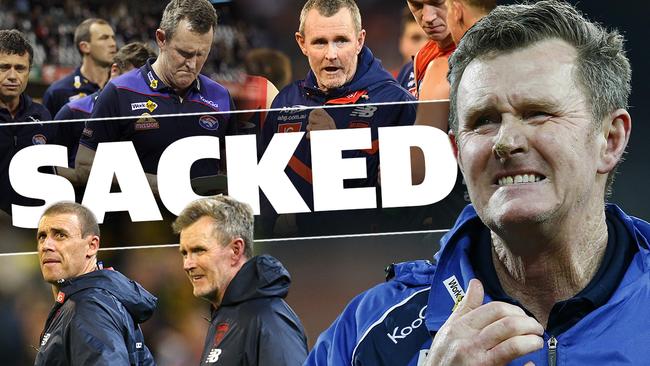
AFL News
Don't miss out on the headlines from AFL News. Followed categories will be added to My News.
It was the halftime exchange Brendan McCartney would love to take back; the moment that may have triggered his downfall as Western Bulldogs coach four months later.
Deep in the bowels of Docklands, McCartney’s anger boiled over.
The frustrations of a 2014 season that was not going to plan and murmurings of player discontent had heightened the emotions.
The Bulldogs trailed the cellar-dwelling Brisbane Lions by 27 points at the main break in the Round 12 game.
“I was pretty blunt with them,” McCartney told the Sacked podcast.
“What I should have done was sit them down and said, ‘Right, we are going to win this game, but there are a couple of things we need to change right now’.
“That was an opportunity to help them through a really stressful game.
“I didn’t provide what they needed. I did what had emotionally taken me over.
“(I told them) it was an unacceptable effort and there was a level of selfishness.
“The same message could have been delivered in a really positive way.”
The Bulldogs almost pinched the game in the second half, but McCartney suspects something more valuable than four premiership points was lost.
Those who have worked with McCartney at five AFL clubs describe him as one of the best developers of young talent in the game.
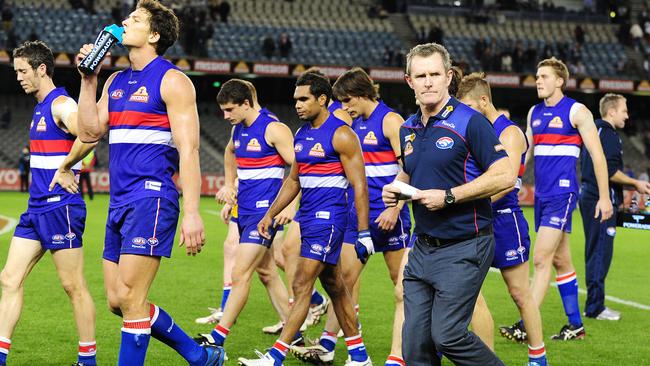
They speak passionately about his ability to deliver incisive messaging balanced by nuggets of positivity.
He started that way at the Bulldogs.
Acclaimed for helping to rebuild a list in dire need of an overhaul, he played a role in the early development of stars Marcus Bontempelli, Jack Macrae, Lachie Hunter, Jason Johannisen and Luke Dahlhaus.
Though the wins didn’t come as often as he would have liked in his first two seasons, his influence earned him a contract extension at the end of 2013.
But as the pressures of 2014 mounted at a club impatient for rapid improvement, he became by his own admission a grumpy bastard in his final few months.
“My biggest learning was I moved away from my fundamental belief that character comes first,” he said.
“I was playing some people in the team that was probably compromising my character philosophy for talent, and not playing others.”
The Herald Sun understands then-Bulldog Jake Stringer was a source of part of his frustration.
McCartney conceded he wasn’t as supportive of a handful of senior Bulldogs, notably Shaun Higgins and Adam Cooney, who found new homes.
“I needed to invest more into (them), when I think back,” he said.
“It is OK to challenge, but if there is a high level of challenge, there has to be a high level of support.
“I kept the challenge going, (but) the support wasn’t there, which caused a fair amount of stress.
“But there were also a couple that were list management decisions.”
Unlike some coaches out of the system, there are no scores to settle or finger pointing.
The remarkably Zen-like McCartney is happy to tell the story behind his departure from the Bulldogs for the first time.
Relive classic AFL matches from the 60s to today on KAYO SPORTS. New to Kayo? Get your 14-day free trial & start streaming instantly
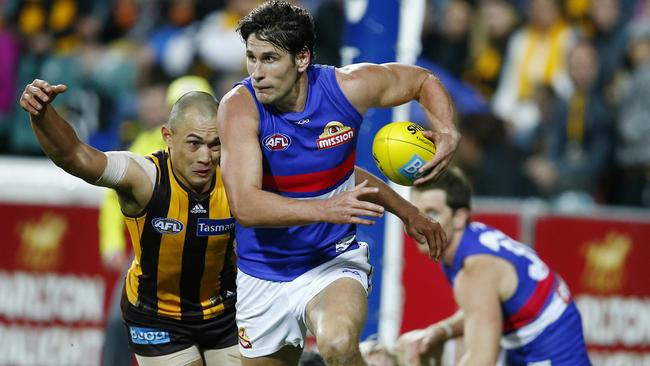
THE GRIFFEN BOMBSHELL
IN a perfect media sound bite, Bulldogs president Peter Gordon guaranteed McCartney’s job on October 3.
Seven days later, the coach was gone.
What transpired came off the back of the Bulldogs’ 14th-place finish in 2014 and a review that included interviews with players and staff.
“You could see the growth through the group and we were pretty brave through a compromised draft period,” McCartney said.
“We were pretty clear on how we wanted them to play. We were losing a lot of games by close margins.
“There was one side of me that was comforted by that, but there was an impatient side, which probably led me to dive into areas I shouldn’t have.
“I got more tired and irritable (and) when you get tired and irritable, you don’t do your best work.
“I got protective and defensive of what I believed in and what I stood for.
“It was the wrong thing to do, but it was coming from a place that was best for the club and the players, in my heart of hearts.”
McCartney assured Gordon he was willing to change aspects of his style.
He was planning for 2015, optimistic the building blocks were in place, and encouraging Geelong defender Tom Lonergan to switch clubs.
Then Ryan Griffen delivered a bombshell.
The man whom McCartney had appointed as captain earlier that season declared he wanted to be traded to Greater Western Sydney.
“I went to bed on Wednesday night thinking I was going to be coaching (in 2015); by Thursday morning, I wasn’t sure,” McCartney said.
“I had a feeling Ryan would leave. He had an incredibly close relationship with Leon (Cameron).
“I was still up for (the challenge). We were thinking it was unfortunate and not ideal, but there was potentially pick four, six and seven (in the draft) here.”
But in a meeting with then chief executive Simon Garlick, who had been supportive, McCartney sensed a change in narrative.
“I went home that afternoon … ‘Garlo’ rang me that night at eight o’clock. He said, ‘Come in tomorrow’. I said, ‘How are we looking?’ And he said, ‘Not great’.”
McCartney’s fate was sealed. If the bullet hadn’t yet been fired, the gun was locked and loaded.
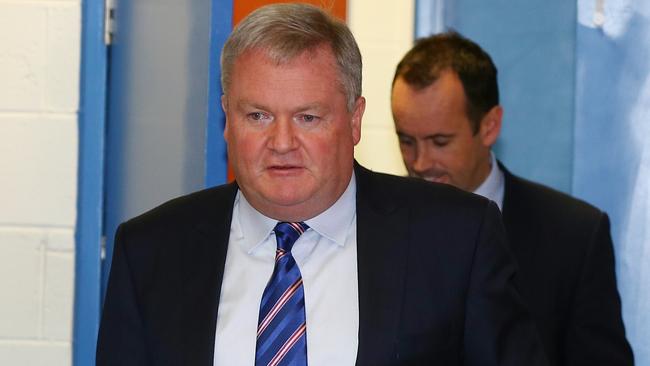
THE FINAL DAY
McCARTNEY was informed of the club’s decision to part ways with him at an 8am meeting on the Friday morning at the Whitten Oval with Gordon, Garlick and football manager Graham Lowe.
“It was a funny day and I will probably never forget it as long as I live,” McCartney said.
His relationship with Gordon “started out as a two-sided conversation and it ended up being one … (but) that was cool”.
“Whether it got to the stage where he thought, ‘No, we have got to make a clean break’, whether he thought I was the right bloke … or whether he thought Luke (Beveridge) was going to be?
“To his credit, on behalf of the club, he made some decisions and he was proven right.
“What I do know is that a lot of the building blocks were there. I just got the last couple of months wrong.
“They asked me to think about resigning. But I said, ‘I don’t really want to resign. If I don’t resign, what will happen?’ They said. ‘We’ll get you to resign’.”
McCartney farewelled his colleagues and wrote a letter to members telling them, “Despite what you are hearing and seeing, (the Bulldogs) are going to go forward.”
As Gordon opened the press conference, McCartney left the venue that had been his home for three seasons.
“The photographer guys were heading out towards Barkly St,” he said. “I saw them walk past my office window and I walked out straight behind them.
“I walked through the day care centre and had a couple of cans with a couple of construction workers in the construction yards, and got in my car and drove home.
“I had a listen to the first couple of minutes of the press conference and didn’t really like what I was hearing.”
He remained “cranky” for a few months before a close friend told him, “You can’t pass your bitterness on … it’s toxic”.
“I got on with life,” he said.
He had the same emotion when the Bulldogs shocked the footy world 23 months later with a bolt from the blue premiership ending a 62-year drought.
“We were watching with friends … their initial reaction was one of a bit of sympathy for me, which I didn’t want,” he said.
“I was just happy for the club and really happy for the players and the coaches.
“I probably had a minute of ‘Jeez’ … to ‘Nup, this is good for footy and good on them’.”
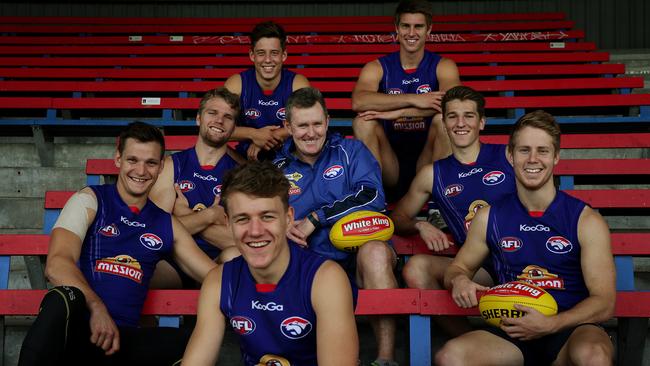
LIFE AS A CAT
A DECADE with Geelong in its most successful era was the “most rewarding experience” of McCartney’s football life, but it wasn’t without challenges.
The most turbulent came during a 2006 season that saw the Cats fail to meet expectations, bringing intense pressure on coach Mark Thompson and the players who were still a work in progress.
There were rumours Thompson would be replaced by Daryn Cresswell as an intense club review caused angst.
“It was even difficult going into supermarkets in 2006 because you would get harassed,” McCartney said.
“There was a raft of stories floating around and if a 10th of them were true, it was like a rock concert every day of the week down there.
“They weren’t (true).
“We bunkered down when the criticism came and a lot of us got a bit defensive and took it personally.”
Thompson, he said, “went quiet … (as a) protective mechanism. He’s a fighter, a strategist and a thinker. There was an element of him that never lost sight of what he thought was possible with the group.”
The coach retained his job, and thanks to some frank conversations and a transformation of training standards and loads, the club flourished.
“Halfway through 2006, ‘Hock’ (Steven Hocking) presented an idea to us that the season was effectively gone and that we had to learn to train. We hadn’t got the loads right and there were a lot of things at play, (including) compatibility through the footy department.
“They were training like a pre-season in season and that wore them out a bit on game day, but they started to learn how to handle the load.
“It was calculated risk, but they were starting to mature enough as a group … and that transferred into a really tough summer of training, it was probably the hardest I’ve ever seen a group train.”
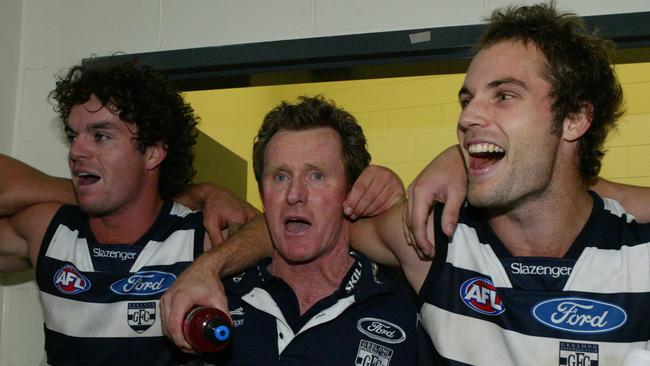
WHO THINKS WE CAN WIN THE FLAG?
THE pressure on Geelong remained high early in 2007 with two wins in its first five games.
McCartney recalled: “The North game (in Round 5) was quite confronting, with the reaction from the crowd, and the hometown reaction.
“The conversation on the Monday was led by Gerard Murphy (from Leading Teams).
“He led off … with, ‘Who in the rooms thinks we can win a premiership?’ Not a lot of hands went up … about five to 10.
“We spoke about a lot of things in the old meeting room, it was simplifying what the players wanted to stand for and they came up with three things — inside 50s, tackles and contested ball, and that’s all they wanted to know.
“We worked out when we won all three, we just didn’t lose quarters.”
The training in the lead-up to the Round 6 game against Richmond was brutal.
“The way we trained that week … was carnage … but the confidence grew.”
Geelong won 19 of the next 20 games, including the 2007 Grand Final by a record 119 points.
“I guess if you are in a Grand Final and you are spending the last 15 minutes working out who is going to be off the ground at the end, you’ve had a good day.”
It was a very different story 12 months later when Hawthorn upset a Geelong team that had lost only one other game for the season.
It’s a game that still sits uneasily with McCartney.
MORE SACKED
Ricky Nixon’s Frawley concussion claims: ‘He started to behave very strangely’
“I don’t know what everyone else is like, but it (2008) jumps into my head every day at some stage.
“They (the players) were annoyed at themselves.
“They were annoyed at us (the coaches), probably structurally, how we set up and how we adjusted to the game, the team we picked, how Hodgey (Luke Hodge) had so much influence and how we were unable to negate it.”
That 2008 loss set the seeds for further Cats’ premierships in 2009 and 2011, by which time McCartney had moved on to fresh challenges.
Originally published as Sacked: Brendan McCartney speaks in depth for the first time about his dramatic departure as Bulldogs coach

